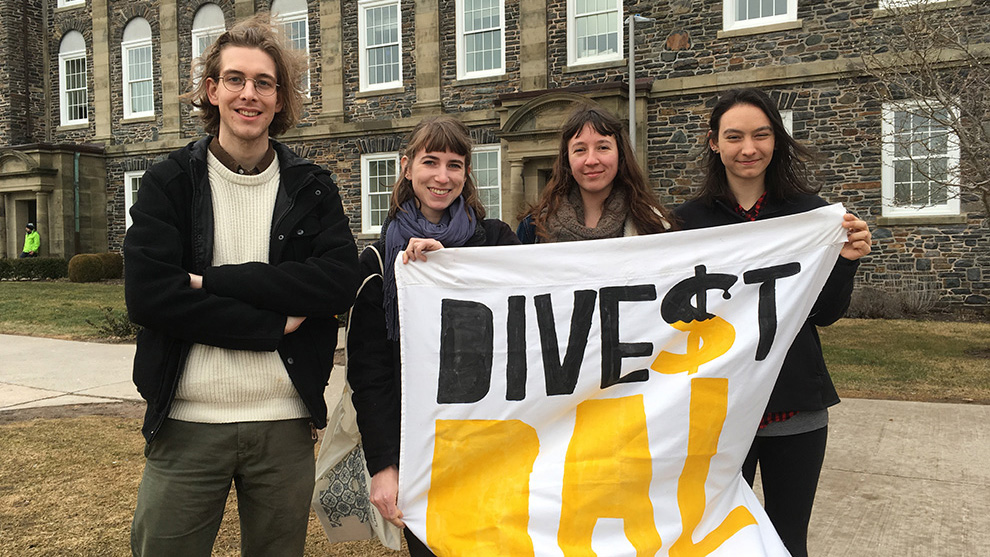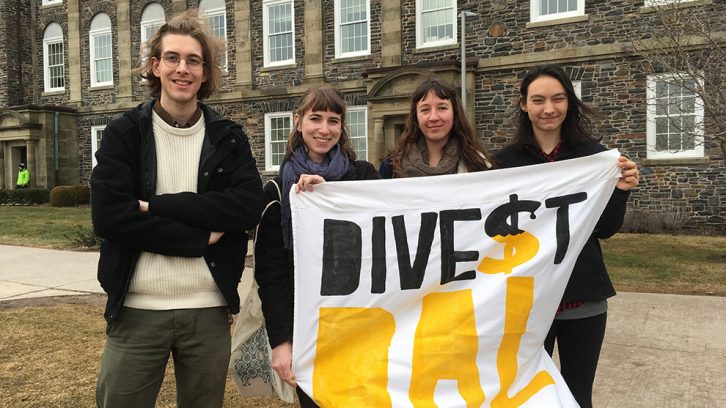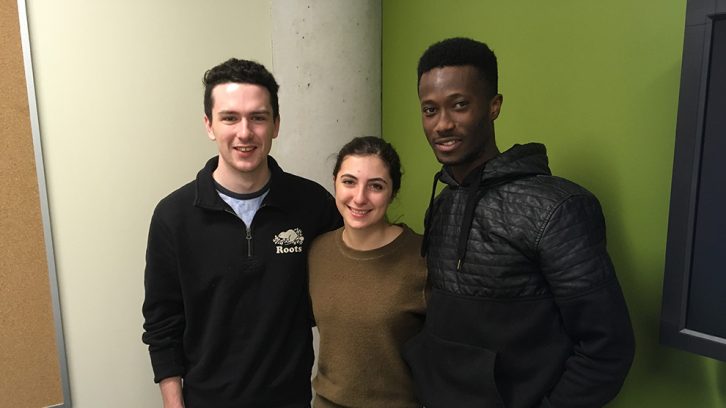Energy
Exploration or Exploitation? Dalhousie students divided over energy futures
Dal geology students and Divest Dal both want to save the environment, but they disagree on how

caption
Divest Dal members Cameron Lowe, Laura Cutmore, Annika Dijskman, Naomi Bird
caption
Divest Dal members Cameron Lowe, Laura Cutmore, Annika Dijskman and Naomi BirdAs a group of Dalhousie geology students prepares for an annual petroleum research competition, environmental and social justice groups, like Divest Dal, are concerned that this research is another step in the wrong direction for the university.
At the start of each winter semester, the Basin and Reservoir Lab assembles a team of students who will participate in the American Association of Petroleum Geologists (AAPG) Imperial Barrel Award (IBA).
Professor Grant Wach, director of the lab, says the IBA provides students with “real world experience within the oil and gas industry,” with industry professionals closely following the competition.
On Friday, Jan. 13, the association released its official data set of the North Carnavon Basin on the Northwest coast of Australia. Students will use the data from geological maps to figure out the best ways of accessing the fossil fuels found within the basin.

caption
Dal IBA team members Colton Bentley, Sydney Stashin and Kenneth Martyns-Yellowe“We’re feeling confident about our chances, even in the first week,” says Kenneth Martyns-Yellowe of the Dal team. Dalhousie won the Canadian competition in 2013 and Martyns-Yellowe says “we’re hoping to do it again this year.”
Martyns-Yellowe, who comes from an island near the city of Port Harcourt in southern Nigeria, feels strongly that fossil fuel companies can make a beneficial impact on the world.
Throughout his youth, as he attended a military school, Martyns-Yellowe remembers having to use candles and kerosene lanterns to study after dark.
“I was able to see first-hand change in terms of discoveries and technological advancements brought by the energy industry,” he says, as it delivered electricity, Internet connectivity and infrastructure developments that the country had never experienced before.
But Laura Cutmore, a spokesperson for Divest Dal, says this focus on fossil fuel extraction is “fundamentally exploitative and it’s not what we need.”
Divest Dal is a group of social and environmental activists who recently made headlines when they coaxed Prime Minister Justin Trudeau into a selfie photo-op, only to blindside Trudeau with questions about implementing the United Nations Declaration on the Right of Indigenous Peoples.
Loved seeing our PM .@JustinTrudeau in Halifax for a selfie! pic.twitter.com/bjv7tWrKpz
— Divest Dal (@DivestDal) January 17, 2017
Founded in 2013, Divest Dal have been campaigning to have the university’s endowment fund divested from the world’s top 200 fossil fuel companies.
Team member Sydney Stashin feels divestment could negatively affect renewable industries. She says, “oil companies will be some of the bigger players on the forefront of renewables.”
“You see it in Shell, they’re investing more in solar and geothermal,” she says. “The change is coming and I think it will come from within these companies.”
Unlike Stashin, Cutmore doesn’t trust fossil fuels companies to lead a “just transition.”
Cutmore says, while these companies fund “small renewable projects,” they are not offering the kind of robust energy alternatives that environmental groups like Divest Dal are advocating for.
“I don’t think any sort of transition that these fossil fuel companies could lead would be that transition,” she says, adding “we need transitions that are community led,” that don’t involve these businesses.
Team member Colton Bentley says of environmental groups, “I definitely think we’re on the same side; I just think we’re coming at it from different perspectives.”
The whole team say they respect environmental causes like the ones Divest Dal champions, but they believe the energy industry can only be changed from within — and that their generation is up to the task.
“I think we all have to come together on this conversation,” says Stashin.
Cutmore agrees.
“There doesn’t seem to be a lot of communication between these different camps,” she says. “These are important conversations that we need to be having.”

